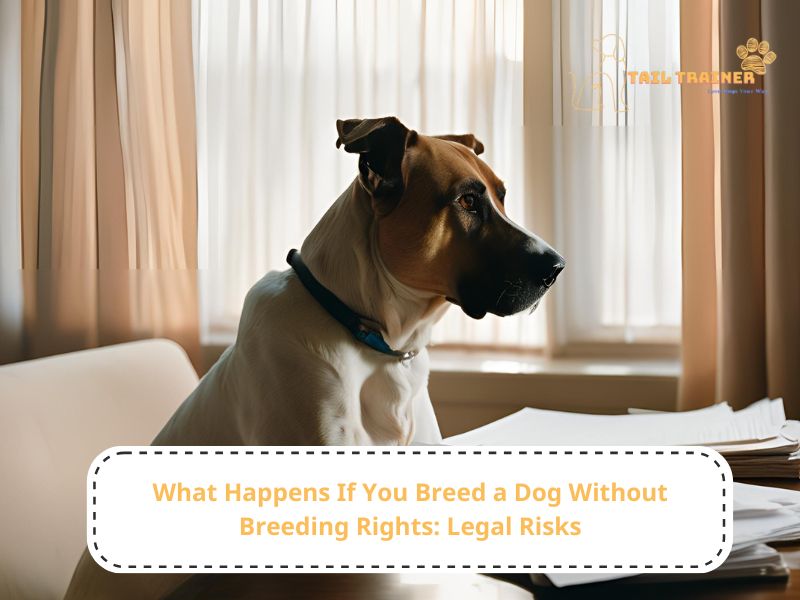Breeding a dog without breeding rights can result in serious legal, ethical, and financial consequences. Breeding rights are typically established by dog breeders to maintain control over the quality and lineage of dogs. Without these rights, owners may face penalties or other issues. For more dog care advice, check out Tail Trainer!
Key Takeaways
What Happens if You Breed a Dog Without Breeding Rights?
Breeding a dog without breeding rights can lead to legal issues, fines, and restrictions on puppy registration. It also raises ethical concerns and can negatively impact the dog’s welfare.
Understanding Breeding Rights in Dogs

Breeding rights refer to legal permissions granted by a dog breeder to the dog owner, allowing them to breed the dog legally and responsibly. These rights are often tied to contracts that include guidelines to ensure the welfare of both the breeding dogs and the resulting puppies.
Why Breeding Rights Matter
Breeding rights are not just a formality; they are designed to ensure responsible breeding practices. Breeders often require these rights to maintain the integrity of the breed, control the dog’s lineage, and prevent unethical breeding practices.
How Breeding Rights Protect Dogs
Breeding rights help ensure that dogs are bred in a safe, healthy, and ethical environment. They protect dogs from:
- Overbreeding: Breeders set limits to prevent overbreeding, which can lead to health issues.
- Genetic disorders: Responsible breeders test dogs for genetic conditions before breeding, which helps reduce the risk of passing on hereditary disorders.
- Unethical breeding practices: Breeders can monitor and enforce ethical standards to avoid practices like puppy mills.
Legal Consequences of Breeding Without Rights

Breeding a dog without breeding rights can result in legal action from the original breeder or the kennel club that issued the dog’s pedigree.
Breach of Contract
Most breeders have contracts that restrict breeding rights. Breeding a dog in violation of this contract can result in legal action for breach of contract. Breeders may seek penalties, reclaim the dog, or enforce other stipulations outlined in the agreement.
Examples of Breach of Contract
- Fines: Some contracts specify monetary fines for unauthorized breeding.
- Loss of ownership: In severe cases, the breeder may reclaim ownership of the dog.
- Puppy return: The breeder may require the return of any puppies born from unauthorized breeding.
Kennel Club Restrictions
Kennel clubs, such as the American Kennel Club (AKC) or United Kennel Club (UKC), enforce strict rules regarding breeding. If a dog is bred without proper breeding rights, its puppies may not be eligible for registration, limiting their ability to participate in dog shows, competitions, or official breeding programs.
Ethical Concerns of Unauthorized Breeding
Aside from legal issues, breeding a dog without proper breeding rights raises significant ethical concerns. Responsible breeding is more than just producing puppies; it’s about ensuring the health, temperament, and genetic integrity of the breed.
Health Risks to the Dog
Breeding dogs require careful health screening to ensure they are fit for reproduction. Breeding without these screenings can put both the mother and puppies at risk for health problems, such as:
- Complications during pregnancy: Dogs with underlying health issues may experience severe complications during pregnancy or delivery.
- Genetic disorders: Without genetic testing, puppies are at risk of inheriting genetic disorders that could affect their quality of life.
Common Genetic Disorders in Dogs
- Hip dysplasia: A common disorder in larger breeds that causes joint pain and mobility issues.
- Progressive Retinal Atrophy (PRA): A genetic disorder that causes gradual vision loss, prevalent in several dog breeds.
Impact on Breed Standards
Breeding without rights often means bypassing established breed standards. This can lead to a decline in the quality and characteristics of the breed, affecting their temperament, appearance, and health over time.
Examples of Decline in Breed Quality
- Physical traits: Puppies may not exhibit the desirable physical traits expected of the breed, such as size, coat color, or body structure.
- Temperament issues: Breeding dogs without evaluating their temperament can lead to behavioral issues in puppies, affecting their suitability as pets or working dogs.
Financial Implications of Breeding Without Rights

Breeding dogs can be costly, especially without proper planning or permission. The financial implications extend beyond potential legal fees and fines.
Cost of Raising Unregistered Puppies
Puppies born from unauthorized breeding may be ineligible for pedigree registration, which affects their market value. These puppies often sell for lower prices, making it harder for breeders to recover their costs.
Costs Involved in Raising Puppies
- Veterinary care: Regular vet visits, vaccinations, and potential emergency care during pregnancy or delivery.
- Feeding and supplies: High-quality food, supplements, and puppy supplies.
- Marketing and placement: Finding homes for unregistered puppies can be challenging, requiring extra time and effort.
Potential Fines and Legal Fees
If a breeder pursues legal action for unauthorized breeding, the dog owner may face fines and legal fees. These costs can quickly add up, often exceeding any potential profit from the puppies.
Responsible Alternatives to Breeding Without Rights
If you own a dog without breeding rights but wish to contribute to the breed, there are several responsible alternatives to consider.
Participating in Dog Sports or Shows
Many kennel clubs offer programs for dogs that are not intended for breeding but excel in sports, shows, or other activities. These programs allow you to enjoy your dog’s talents and showcase their qualities without breeding.
Consider Co-Ownership Arrangements
Some breeders offer co-ownership arrangements where the dog is bred under the breeder’s supervision. This ensures that breeding is conducted responsibly while allowing the dog owner to be involved in the process.
Spaying or Neutering
If breeding rights are not granted, consider spaying or neutering your dog to prevent accidental breeding. Spaying or neutering also has health benefits, such as reducing the risk of certain cancers and behavioral problems.
Frequently Asked Questions
What happens if you breed a dog without breeding rights?
Breeding without rights can lead to legal consequences, financial loss, and unregistered puppies. It may also result in penalties outlined in the breeder’s contract.
Can I register puppies born from unauthorized breeding?
No, puppies born from unauthorized breeding are generally not eligible for pedigree registration with major kennel clubs, affecting their value and future breeding potential.
Are there any legal ways to obtain breeding rights for my dog?
Yes, you can discuss obtaining breeding rights with the breeder. This may involve paying an additional fee or meeting specific requirements, such as health testing or participation in dog shows.
How can I avoid accidentally breeding my dog?
Spaying or neutering your dog is the most effective way to prevent accidental breeding. Regular monitoring and proper containment also help prevent unplanned breeding.
Is it ethical to breed dogs without permission?
No, ethical breeding involves proper health screenings, temperament evaluation, and adherence to breed standards. Breeding without permission compromises these principles.
To make informed decisions about dog breeding and care, visit Tail Trainer regularly! Responsible dog ownership starts with understanding the rules and rights involved.
